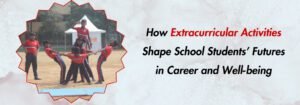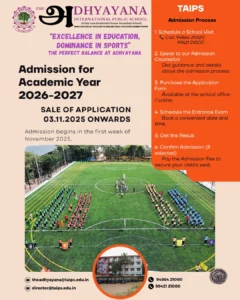Extracurricular Activities Benefits are many and varied, and they reach far beyond the walls of the classroom. When students take part in activities outside their regular studies, they gain valuable life lessons that help build strong character and create pathways to success in many areas of life. This blog explores how involvement in clubs, sports, music, arts, and community service can lead to personal growth, better academic performance, and improved career prospects.
A Pathway to Personal Growth
Participation in extracurricular activities helps individuals develop skills that are not always taught in textbooks. These activities create an environment where students learn to manage their time, set personal goals, and work with others in a relaxed setting. They learn to handle responsibilities, solve problems, and build resilience in the face of challenges. The experiences gathered from these activities help shape well-rounded individuals who are better prepared to face everyday obstacles with confidence and determination.
Building Social Skills and Connections
Being part of a team or a group can boost self-confidence and help build lasting friendships. When students work together toward a common goal, they learn about cooperation and effective communication. These social skills are essential not only for school but also for life after graduation. The sense of belonging that comes from participating in an activity provides a support system that can be crucial during stressful times. Moreover, these connections often lead to opportunities later in life, including networking for job prospects and collaborations in future projects.
Enhancing Academic Performance
It is a common misconception that extracurricular activities distract from academic success. In reality, involvement in these activities often improves academic performance. The discipline and time management skills that are honed during after-school programs can lead to better focus during classroom hours. Students learn to balance their study time with their activity commitments, which can improve concentration and lead to more efficient learning. Schools that encourage such participation often see a positive impact on overall student achievement, with many studies suggesting a link between active participation and higher grades.
Developing Leadership and Responsibility

Extracurricular activities offer a practical setting for learning leadership skills. Whether it is organizing an event, leading a team in sports, or taking charge of a project in a club, students are given opportunities to develop leadership qualities. These experiences teach them how to make decisions, listen to others, and take responsibility for both successes and failures. Over time, these skills translate into improved leadership in academic settings, community projects, and eventually in the workplace. In these roles, students learn that leadership is not about giving orders, but about guiding a team towards a common goal and sharing in the journey toward success.
Learning Through Diverse Experiences
Participation in activities outside the classroom introduces students to a variety of subjects and skills. They might find a passion for music, sports, drama, or community service, which can become a lifelong interest or even a career path. This exploration helps individuals discover their strengths and preferences, making them more likely to pursue fields where they can excel. Additionally, these diverse experiences make students more adaptable and open-minded, qualities that are highly valued in every area of life.
Gaining Real-World Experience
Extracurricular activities often simulate real-world challenges in a controlled environment. Whether it is running a school play or competing in a sports league, students face situations that require quick thinking and adaptability. These experiences build problem-solving skills and the ability to work under pressure. By facing real challenges in a safe space, students learn how to deal with setbacks and how to work through problems systematically. This kind of practical learning is essential when stepping into higher education or entering the workforce, where similar challenges are encountered on a daily basis.
Balancing Academics and Interests
A well-rounded education does not focus solely on textbooks and lectures. It is equally important to explore interests outside the academic curriculum. Extracurricular activities provide a much-needed balance by offering a break from academic pressures and a chance to pursue personal interests. This balance not only helps prevent burnout but also promotes mental and emotional well-being. Students who are engaged in these activities tend to have a more positive outlook on school life and are more likely to be motivated and excited about learning.
Preparing for the Future
The skills and experiences gained through extracurricular activities are highly regarded by colleges and employers. Admissions officers often look for candidates who have demonstrated initiative, teamwork, and leadership outside of the classroom. Similarly, employers value candidates who have real-world experience, who can communicate well and who show a commitment to their interests and personal growth. Participation in extracurricular activities can thus be a valuable part of a student’s resume, setting them apart in a competitive academic and professional landscape.
The Long-Term Impact on Success
The benefits of participating in extracurricular activities extend far into adulthood. Many successful professionals credit their achievements to the early lessons learned in school clubs, sports teams, and community projects. These activities teach perseverance, adaptability, and the importance of hard work. Even after leaving school, the habits and skills developed continue to influence personal and professional decisions. Individuals who actively participate in extracurricular activities often find that they are better equipped to handle the challenges of everyday life, making them more successful in their careers and personal endeavors.
A Richer Life Beyond the Classroom

In conclusion, the benefits of extracurricular activities are profound and lasting. They offer much more than a way to fill time after school; they are a critical part of a student’s development and growth. From building social skills and academic discipline to preparing for future careers, these activities play a significant role in shaping well-rounded, successful individuals. By participating in extracurricular activities, students are not only learning valuable skills but also creating memories and experiences that will guide them through life. This journey of self-discovery and growth is what truly makes the path beyond the classroom so rewarding.




